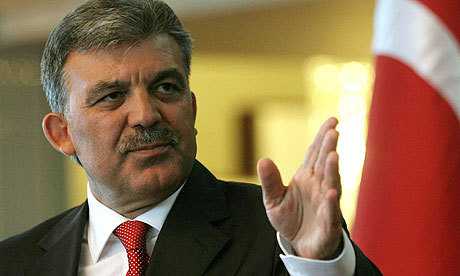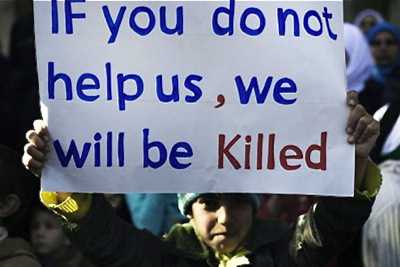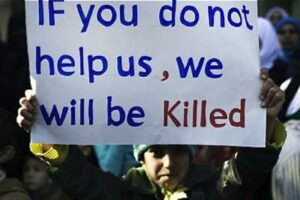Turkey Confronts Syria Imbroglio
The proposed UN Resolution would have supported the Arab League’s peace plan. In the negotiations preceding the vote, Moscow’s objections prompted Western powers to soften the resolution’s tone. The failure to satisfy Russia’s expectations that the Syrian opposition is also given sufficient warning and Assad is not forced to leave power created a delicate situation. The lack of a breakthrough on a compromise draft prompted the backers of the resolution to put it to the UN Security Council for a vote. Hours before Russia and China vetoed the draft resolution, Assad forces continued their violent campaign, shelling Syria’s third largest city Homs, which, according to many reports, killed hundreds of people.
While video footage showing Syrian forces’ alleged atrocities and the conflicting accounts of the death toll could not be independently verified and the Assad regime denied such reports, this development triggered an acute reaction in Turkey both at the governmental and popular levels (Anadolu Ajansi, February 4). Turkish anger was further fueled by the fact that the attack on Homs was executed on the anniversary of the infamous Hama massacre of 1982, when Assad’s father, Hafez al-Assad, had tens of thousands of people killed. Moreover, reportedly, during the bombardment of Homs some mosques were targeted, while Muslims were celebrating a sacred night marking the birth of the Prophet Mohammed.
More remarkably, the clashes between the Syrian army and the forces of the Free Syrian Army spread to the Turkish border, and gunfire was heard in the border villages in the Turkish province of Hatay throughout the night. While some Syrian villagers fled to refugee camps in Turkey, where thousands of people including the leaders of the Free Syrian Army were already taking shelter, bullets from the clashes hit the homes in Turkish villages, which were televised live, raising public interest in these developments (Sabah, February 5).
Like in other nations, Turkish people also organized demonstrations outside Syrian diplomatic representations in protest against these developments (www.turkiyegazetesi.com, February 5). Though the demonstrations were not large-scale, they have nonetheless attracted a significant number of people since the beginning of the uprisings. This development was also important because it signified a gradual transformation in Turkish people’s perception of the situation in Syria. Previously, Turks focused more on the geopolitical aspects of the Syrian uprising than the humanitarian tragedy caused by the regime’s brutal crackdown, believing that there was Western manipulation to change the regional balance of power. Many Turks, including conservative segments of society, harbored suspicions about the root causes of the uprisings and were critical of the Turkish government’s outward opposition against the Damascus regime, believing that it was acting as a subcontractor of the West (EDM, November 15, 2011). The recent demonstrations indicate that the Turkish public might become more supportive of their government’s policy on Syria and focus on the humanitarian aspects of the crisis.
The Turkish Foreign Minister, Ahmet Davutoglu, attending the Munich Security Conference together with other world leaders, criticized Moscow and Beijing. Questioning the morality of their behavior, Davutoglu maintained that they acted with a Cold War mentality and the price for the vote would be paid by the Arabs and Turks in the region. Davutoglu emphasized that Turkey would continue to support the Syrian people’s struggle. Expressing solidarity with Syrians, Davutoglu added that Turkey would embrace the entire population of this country if they needed Turkey’s help (www.ntvmsnbc.com, February 4).
Ankara’s ties with Damascus became contentious at the outset of the Syrian uprising and, over time, Turkish leaders broke with their former ally Assad and asked him to step down. Meanwhile, Ankara supported the umbrella organization, the Syrian National Council in bringing together opposition groups, as well as hosting thousands of refugees (EDM, August 10, 2011). The presence of members of the Free Syrian Army in refugee camps has led to speculation that Turkey was arming the rebels against Damascus. When an earlier attempt at imposing sanctions on Syria failed in October 2011, due to Russian and Chinese objections, Ankara went ahead and adopted sanctions in coordination with Western powers. Turkey also coordinated its diplomatic initiatives with regional countries and worked hard to ensure the peace plan by the Arab League would succeed. Davutoglu undertook enormous diplomatic efforts to convince Tehran, the chief regional ally of Damascus, to work together toward a solution of the crisis and the prevention of sectarian tensions in the region (EDM, January 10). In a subsequent effort, he traveled to Moscow to exert pressure on Damascus (Anadolu Ajansi, January 25).
As his reaction to the recent failed resolution at the UN demonstrates, Davutoglu has been frustrated over the lack of progress on the diplomatic front. Two statements released by the foreign ministry regarding the ongoing atrocities by Damascus and the UN Security Council vote reflect similar thinking (www.mfa.gov.tr, February 4). While the first statement maintained that “The shelling by a country’s official security forces of its own cities constitutes the most concrete indication that the government of that country has totally lost its legitimacy to rule,” the second statement argued that “The stage that has been reached by the regime’s suppressing the desire of the Syrian people for universal values […] with the use of guns, violence and mass executions has acquired a threatening nature in which international peace and security is at risk.”
This sort of language is one that values human rights over the principles of sovereignty and non-intervention and Ankara has so far underlined clearly that the Syrian regime has lost its right to legitimately rule the country. Turkey, however, has not gone as far as advocating international intervention, and believes that any solution has to come through international legitimacy. Short of international consensus on a UN-orchestrated solution, Ankara is left with little options for changing the situation on the ground.





 On 4 February 2012, the media organizations of the War Party unanimously announced more than 200 deaths in Homs – a city “bleeding” -, the torture of children and “relentless” bombing. We are supposed to be witnessing the “most terrifying massacre” since the beginning of the “revolt“. Spontaneously, attacks were triggered during the night against the Syrian embassies in Washington, Cairo, Kuwait and London.
On 4 February 2012, the media organizations of the War Party unanimously announced more than 200 deaths in Homs – a city “bleeding” -, the torture of children and “relentless” bombing. We are supposed to be witnessing the “most terrifying massacre” since the beginning of the “revolt“. Spontaneously, attacks were triggered during the night against the Syrian embassies in Washington, Cairo, Kuwait and London.
